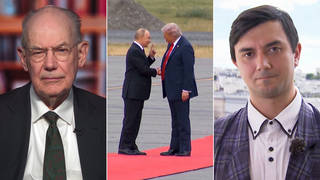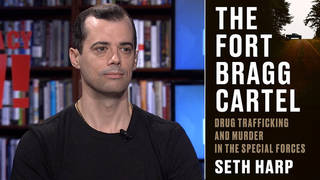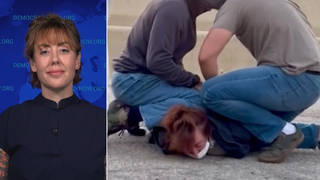
We go to Connecticut to speak with Hartford Courant Columnist Bill Curry about what the race means for Connecticut, the Democratic Party, and the country. “The war is the driving issue here without a doubt,” Curry said. [includes rush transcript]
Today voters go to the polls in the most-watched race of the primary season. Joe Lieberman, the three-term Democratic Senator from Connecticut, is facing his first major challenge to re-election since he won his seat eighteen years ago. His challenger, Ned Lamont is a wealthy former telecommunications executive who has run largely on an anti-war platform.
Senator Lieberman was the Democratic party’s vice presidential candidate in 2000, and ran for President in 2004. He has been harshly criticized for his vocal support of the Iraq war and his continued opposition to an immediate U.S. troop withdrawal. He has also been taken to task for his perceived closeness to President Bush and other Republicans.
Lamont’s steady gain on Lieberman has been fueled by increasing anti-war sentiment in Connecticut. A poll last week showed Lamont beating Lieberman 54-41 percent. The latest poll shows Lamont holding a 6 point lead. Lieberman has promised to run as an independent if he loses today’s primary.
Bill Curry joins us from Hartford, Connecticut. He is a former Connecticut state comptroller and state senator — and he was the Democratic nominee for governor in 1994 and 2004. Bill was also a counselor to President Clinton from 1995 to 1997. He now writes a weekly column for the Hartford Courant.
- Bill Curry. Former Connecticut state comptroller and state senator — and he was the Democratic nominee for governor in 1994 and 2004. Bill was also a counselor to President Clinton from 1995 to 1997. He now writes a weekly column for the Hartford Courant.
Transcript
AMY GOODMAN: This is an excerpt from the Lamont-Lieberman debate that took place last month. Ned Lamont was just asked to explain the difference between him and Lieberman on the Iraq war.
NED LAMONT: Senator Lieberman, over the last three years, keeps saying, “We’re turning the corner. We’re turning the corner. Things are getting better and better.” That corner is a square. We’re not making progress in the war in Iraq right now. As you remember, the senator said over six months ago, “Look at all the cell phones. Look at the satellite dishes. We’re on the way to progress.” In fact, in the last six months the number of sectarian deaths has increased a lot. There are deaths of Americans. It’s going downhill. Tom Friedman calls it anarchy. Others have called it just an incipient civil war.
I think our very visible frontline military presence is making the situation worse. I think that our best hope for success, Tom, our best hope for success is to take the very American military face off of this occupation and start bringing our troops out of harm’s way and start bringing our troops home. We’ll there be for reconstruction. We’ll be there for humanitarian assistance. We’ll be there for political support. But at the end of the day, only the Iraqis can solve this. They can solve it politically, and only they can solve it militarily.
JOANNE NESTI: Senator Lieberman.
SEN. JOSEPH LIEBERMAN: Well, Tom and Joanne, Ned has got me confused again. But I’ll tell you one thing he’s wrong about. The situation in Iraq is a lot better, different than it was a year ago. The Iraqis held three elections. They formed a unity government. They are on the way to building a free and independent Iraq. Their military — two-thirds of their military is now ready, on their own, to lead the fight with some logistical backing from the U.S. or stand up on their own totally. That’s progress. And the question is, are we going to abandon them while they are making that progress?
Let me repeat. I’m not for an open-ended commitment to Iraq. The sooner we’re out of there, the better it will be for the Iraqis and for us. But if we leave too soon, we will create disaster there — a terrorist state, civil war, regional instability — and the terrorists will be emboldened to strike us again.
So I am confident that the situation is improving enough on the ground that by the end of this year, we will begin to draw down significant numbers of American troops, and by the end of the next year, more than half of the troops who are there now will be home, but not because we set a deadline. That would make it harder.
JOANNE NESTI: Thank you, Senator.
NED LAMONT: I’ll take 30 seconds, if I might.
JOANNE NESTI: Okay, you’ve got it.
NED LAMONT: Look, it’s General Casey who said we ought to start bringing our troops home, you know, as early as September or October. It’s the American generals who are beginning to come up with the timeline. It’s important we set a timeline. The Maliki government is asking us to set a timeline. Many members of Congress are asking us to set a timeline. Many Iraqis are asking us to do that. The Arab League is saying, let’s set a timeline, let the Iraqis know that only they can solve this. We don’t have permanent designs on their oil, no permanent military bases. Let them have a timeframe that they know they’re going to step up.
AMY GOODMAN: An excerpt of the Lamont-Lieberman debate that took place last month. Bill Curry joins us now from Hartford, Connecticut. He’s a former Connecticut state comptroller and state senator. He was the Democratic nominee for governor in 1994 and 2004. Bill Curry was also a counselor to President Clinton from 1995 to ’97. He now writes a weekly column for the Hartford Courant. We welcome you to Democracy Now!
BILL CURRY: Great to be with you, Amy. Thank you.
AMY GOODMAN: Well, what’s happening in your party in Connecticut, Bill, this race between Joseph Lieberman and Ned Lamont that all the country is watching?
BILL CURRY: Well, first of all, the race is certainly a referendum on Bush foreign policy. But at another level, I think it’s also a referendum on a kind of centrism within the Democratic Party, which many Democrats feel, especially under President Bush, that their own party’s centrism has become not just ineffectual, but unconscionable.
And certainly this race says two things loud and clear for any Democrat going into the Congress, should the Democrats take the majority going into the presidential primaries: one, support for Bush’s foreign wars ensures fierce opposition from within this party; and secondly, and particularly in the case of Senator Lieberman, support for the culture wars, as well, for the Schiavo kinds of crises, for the Bill Bennetts and Limbaughs, etc., that any trafficking in that kind of politics is just no longer, I think, going to be tolerated. People want their party to speak for pluralism, for tolerance and mutual acceptance, for right to privacy.
And I think that both of these — the war is the driving issue here, without a doubt. And this party, it hasn’t put an alternative on the table. It may, in fact, I think, in November win by default. But the one thing is for sure, that the present course is being rejected, and so those things overwhelmingly.
Over time, there’s a sense among liberals in this state, in particular, that Senator Lieberman has made his career using them as a kind of backboard for his political bank shots, setting himself up as the sort of transcendent, bipartisan moderate, in opposition to the marginal sort of extremism of mainstream Democrats. And there’s been a resentment brewing over that.
In my state, as you said, I ran for governor twice. I’m one of the only living Americans to lose two statewide elections to a multiple felon. Here, bipartisanship has meant primarily deficit spending and corruption in Washington. Bipartisanship has meant the right of Democrats to agree with the President, as loudly and as frequently as they wish. It’s just no longer popular. In a world in which the two parties are no longer Democrats and Republicans, but incumbents and challengers, the senators’ gifts for conciliation aren’t as marketable.
AMY GOODMAN: Bill Curry, I wanted to talk about what effect this race is having on other races. For example, here in New York. I wanted to go to the Armed Services Committee hearing. This is where Rumsfeld had first said he would not testify publicly, only speak to senators privately, and then under a lot of pressure, he said he’d speak. And he was questioned by New York Senator Hillary Rodham Clinton.
SEN. HILLARY CLINTON: A recent book, aptly titled Fiasco, describes in some detail the decision-making apparatus that has led to us this situation. So Mr. Secretary, when our constituents ask for evidence that your policy in Iraq and Afghanistan will be successful, you don’t leave us with much to talk about. Yes, we hear a lot of happy talk and rosy scenarios, but because of the administration’s strategic blunders and, frankly, the record of incompetence in executing, you are presiding over a failed policy. Given your track record, Secretary Rumsfeld, why should we believe your assurances now?
DONALD RUMSFELD: My goodness. First, I tried to make notes and to follow the prepared statements you’ve presented. First of all, it’s true there is sectarian conflict in Iraq, and there is a loss of life. And it’s an unfortunate and tragic thing that that’s taking place. And it is true that there are people who are attempting to prevent that government from being successful, and they are the people who are blowing up buildings and killing innocent men, women and children, and taking off the heads of people on television. And the idea of their prevailing is unacceptable.
AMY GOODMAN: That’s Donald Rumsfeld, responding to Senator Hillary Rodham Clinton, who called for Rumsfeld’s resignation. Other Democratic senators have done that, but many feel this happened now very close to the Connecticut primary, because of the kind of pressure that’s building on Clinton, as we see Joseph Lieberman behind in the polls in Connecticut. Bill Curry, your response?
BILL CURRY: Well, first of all, in terms of identifying on cultural issues and supporting the war, Senator Clinton is probably the closest to Senator Lieberman within the Senate. Bill Clinton came here to Waterbury, Connecticut, on behalf of Joe about ten days back. And in part it was because, I believe, that the consensus that he had constructed within the party, as well as his own wife’s perspective fortunes in the upcoming presidential primary, should she be a candidate, are very much on the line here.
And Senator Clinton is in a very different situation. One, her husband’s personality transcends the factional differences within the party. His policies don’t so much reconcile them, as his personality engrosses them. But her connection to him gives her a bye that Senator Lieberman wouldn’t have. Secondly, Jonathan Tasini is an impecunious candidate in the great progressive tradition. I think it’s still unclear that you can have a meaningful challenge in this country, unless a multimillionaire happens to want your job. And so they’re in two very different situations.
And lastly, by the way, Senator Clinton, for a couple of years now, has been backpedaling on this and, unlike Senator Lieberman, did not seek a spotlight from which to continue to espouse the President’s position on the war. And so, there are immediate differences, because Jonathan Tasini doesn’t have the kind of money Ned Lamont has and because Senator Clinton has been quieter lately. There’s been a difference.
But for all mainstream Democrats, watching what’s happened to Lieberman, it’s like a herd of gazelles seeing one cut down from the herd by the lions. Again, even should the senator escape today with his political life, they’ve watched this primary. I think it’s the most important primary since Gene McCarthy took on Lyndon Johnson in New Hampshire in 1968 over the Vietnam War. And I think you see many similarities of the old-line liberals in 1968, many of the civil rights leaders. Because of Johnson’s performance on those issues, all of the old labor leaders stuck with Johnson. And McCarthy had to form a kind of adhocracy of unbidden progressives from campus organizations all over the country pouring into New Hampshire. Here, I think the bloggers have played some of that role.
You have a similar situation in Washington, in which the Democratic Leadership Council of the moderates and the sort of Sierra Club, League of Conservation Voters, AFL, they’ve become not so much grassroots organizations as national lobbyists with mailing lists. Their heart is in a subcommittee. If your home is Washington and your job is lobbying, your hobby has to be the care and feeding of incumbents. And one of the things you see with the Lieberman race is this tremendous outpouring of dissatisfaction from people who feel that no one’s been speaking for them for a long time. Everyone within that leadership cadre, not just Senator Clinton, everyone’s looking at this and seeing the effect. I really believe, again, that in the primary debate within the Democratic Party, which in some ways will be the political debate that moves the country beginning after November, the effect of this race in Connecticut is going to be really, really dramatic.
AMY GOODMAN: Bill Curry, I heard something like 14,000 people from Connecticut became Democrats by yesterday at noon. What is the significance of this number? How does the primary work?
BILL CURRY: Well, let’s look at it this way. First of all, it’s the first time Democratic registration has risen like this in my adult lifetime. Again, people are no longer identifying with political parties in this country. When I was a kid, the Democrats were far and away the largest party; the unaffiliateds are now, and it’s been shrinking. And every so often you have to have these kinds of fights to draw people in. I believe that most of that — it’s very hard.
You mentioned, Amy, that there’s been a recent poll showing the race tightening. In some ways I think it’s one of the very few late polls I’ve ever seen that’s not a public disservice, in that we have a gubernatorial race here, as well, in the shadows of this. And that poll showed both races tightening. So at least it will be encouraging people to participate. Their sense of what’s at stake will go up as a result of reading it.
I don’t think that it’s accurate. I think that those registrations you talked about, I think those are mostly Lamont registrations. Again, I’m guessing here. My crystal ball has been on the fritz for a while. But the feel of it, to me, is that those are Lamont registrations. The tightening polls, again, they purport to be polling likely voters. In American polling, the two questions — one, are you a regular church-goer; and two, are you a likely voter — are the two questions people are most likely to fib about, and you end up polling a lot of people who aren’t paying such close attention and don’t have such feelings. Incumbents tend to do better in them. People who are better known or spent more money on television tend to do better in them. In this race, my guess is that it’s moving in a different direction and that we’re seeing an increase in the energy level of the electorate here — a rare increase, a rare up-tick in that — because of the importance of what’s at stake.
AMY GOODMAN: Bill Curry, we have to break, but when we come back, I want to ask about Senator Joseph Lieberman saying if he doesn’t win today’s primary, he will run as an independent. And that’s something he needs about 7,500 signatures for by the end of tomorrow. Bill Curry is former Connecticut state comptroller and state senator, sat next to Senator Lieberman when he, too, was a state senator. And we will talk about these issues.
[break]
AMY GOODMAN: Our guest is Bill Curry, former Connecticut state comptroller and state senator, counselor to President Clinton, currently writing a weekly column for the Hartford Courant. We’re talking about the most watched primary in the country. It’s happening today in Connecticut, and it is Joseph Lieberman, three-term incumbent senator, and he’s being challenged by Ned Lamont. Joseph Lieberman’s plans if he doesn’t win today’s primary, Bill Curry?
BILL CURRY: Well, I’m not exactly sure. His stated plan is to file sufficient petitions tomorrow — the deadline is tomorrow at 4:00 p.m. — to qualify to run as an independent. And there’s been a great deal of pressure already from others within the party to discourage him. I think that a lot of this depends on, number one, how does he really feel? Is he in a kind of John Paul Jones mood, or is he more in shellshock? If he loses this, is it by a wide margin or is it closer?
And then, thirdly, there’s a question here of the Republican nominee. It’s been reported that when the Republican nominee, Alan Schlesinger, was nominated at their convention, that the delegates made sheep-like bleeding noises, because he was a sacrificial lamb, in their views. He is as close to a nullity as you can possibly find in major party politics, a professional card counter who recently admitted that he had forged a what’s called a “wompem card” at the Indian casinos that gets you free shrimp. He later had it disclosed that he had been sued by casinos on bad debts and that even though he was a professional card counter, he had never won. He has about 8% in the polls.
Lieberman’s prospects in the general election — once, he led the general by a wide margin. My guess is that should Lamont win today, that margin will also narrow. And whether or not Schlesinger remains in this race, after all of these disclosures regarding the rest of his life, is a big, big question. Schlesinger could be Joe Lieberman’s ticket to re-election. If there’s someone in that Republican slot, whom Republicans simply can’t vote for, you get not only the ones who would be inclined toward Lieberman, but lots of others who feel they haven’t a choice. Should he depart and a stronger candidate replace him, I think that would also affect him.
Also, this has an effect on — there are at least two, possibly three, congressional races here in just our little state that are very close and in which the outcome in the House could depend. And there’s a pretty bitter disagreement as to whether or not Lieberman’s presence as an independent candidate in November would impede their prospects, the prospect of the Democratic candidates winning control.
AMY GOODMAN: Bill Curry, we had invited both candidates into our studio. Ned Lamont took us up on the offer. And I asked him how much pressure there was on him not to run.
NED LAMONT: I think he’s representing himself. I think that the people of Connecticut have it right. They know that “stay the course” is not a winning strategy. It’s time for us to change course, time for us to get our troops out of harm’s way and start bringing them home. And I don’t think the senator has been in the state. He hasn’t listened. And I think he’s wrong on that.
AMY GOODMAN: How much pressure was there on you not to run, not to weaken a Democratic candidate in this midterm time when the Democrats could take the House and Senate?
NED LAMONT: There was some of the party brass in state central there in Hartford, Connecticut, didn’t like the idea of a primary. They thought we might be rocking the boat. Don’t jeopardize the safe seat. But by the same token, I can tell you that the grassroots support was overwhelming. And that’s at the town committee level, the delegates at the convention, as you pointed out, where we far exceeded anybody’s expectations. And I think going forward, people realize that this is good for the Democratic Party. We’re having an old-fashioned kitchen table debate about what type of a party we are. What do we stand for? It’s for the heart and soul of the Democratic Party. And on August 9, we get together again and we go forward. And so I think it’s going to be good for the Democrats, and I think the party brass will eventually come around to that.
AMY GOODMAN: We did that interview on June 6. Bill Curry, final comment on who Ned Lamont is, where he comes from.
BILL CURRY: Well, I’ve had some long conversations with him. First of all, he’s a bright, very capable guy. He strikes me as somewhat closer to Lieberman in his own politics than people, some of his supporters, may expect. He describes himself as a centrist. The New York Times, in their strong endorsement of him, called him a moderate. I think in this general election, whether Lieberman is a candidate or not, should Lamont win, he’ll be at pains to present himself that way.
There are lots of things that they haven’t gotten to. What is your theory of national security? We’ve moved passed the age of nation states and passed the age of fossil fuels, and we’re still presenting ourselves as the first superpower. We’re going to war over oil, among other things, for sure. And what is a theory of national security based on mutual security and cooperation? We need a whole new approach. That kind of thinking isn’t in a political debate in an election.
A fundamental question, though, of whether this political party, the Democrats, is about to stand up more strongly than it has against the cowboy unilateralism of the Bush administration and against the divisive cultural politics that have racked this country, I think coming out of tonight, there will be at least an improvement in that. The Democrats will know a little better than they have in a long time what they’re not for.
AMY GOODMAN: Bill Curry, I want to thank you very much for being with us, former Connecticut state comptroller and state senator, currently writing a weekly column for the Hartford Courant. Yes, the primary in Connecticut is today, and we’ll certainly bring you more on this race tomorrow on Democracy Now!












Media Options